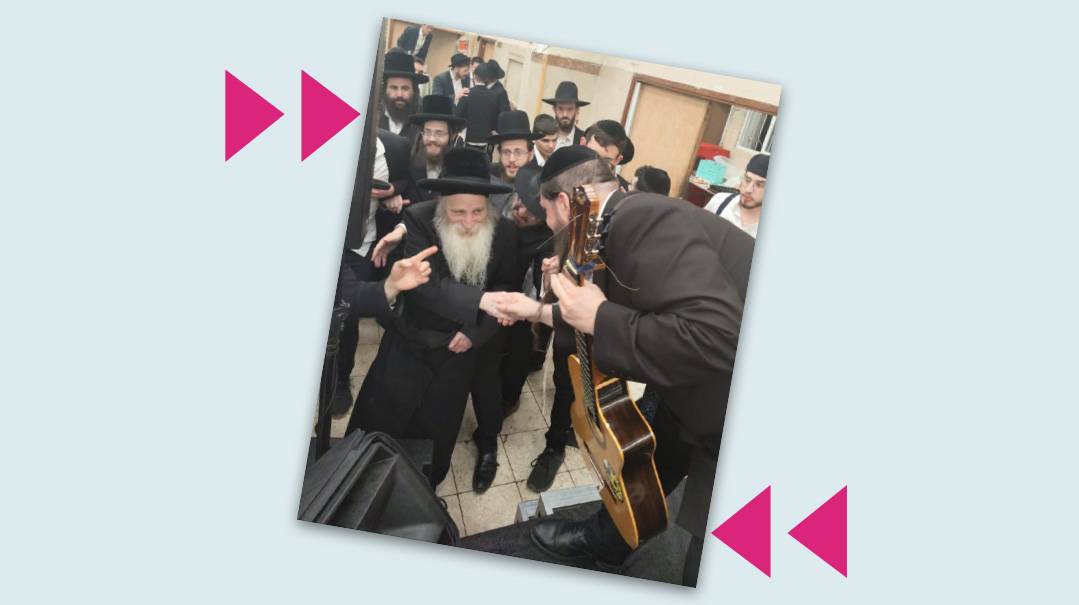Endnote: Issue 1067
| June 24, 2025A collaboration between Pinky Weber and Dovy Meisels is turning heads

Just Out: New Releases, Fresh Takes
How Much Longer?
The newly released album Krechtz, a collaboration between Pinky Weber and Dovy Meisels, is turning heads with its fusion of old-style chassidish song and today’s more raw and plaintive tone. What makes it even more interesting that the connection between twentysomething singer Dovy Meisels and veteran composer and badchan Pinky Weber was not originally forged through music, but through Torah.
“Reb Pinky gives an hour-long shiur every morning before Shacharis, and I was his talmid. I attended that shiur for a couple of years, and we became friends through that. Not all listeners know Pinky as a talmid chacham and maggid shiur who has written a sefer, but that was how I got to know him,” Dovy says.
When Dovy eventually approached Pinky for a song, he offered the young singer his plaintive Yiddish ballad “Kretchma” [“Biz in kretchma, darf men oich a trink…”] which they sang together as a single released in 2021. More recently, when the composer suggested another collaboration, both Dovy’s producer Naftali Schnitzler and creative director Heshy Weinberger advised him to take the opportunity and run with it. Over all his decades of composing hits and creating once-in-a-lifetime moments for couples and families at their mitzvah tantz, Pinky hasn’t made that much time for studio recordings.
“It seemed like a dream that Pinky would agree to collaborate and sing on an album, but that dream morphed into reality over two and a half years of very hard work,” Dovy says.
While most of the songs have Yiddish lyrics, there is an accessible and openly emotional quality to them, which Dovy expresses as, “You don’t have to understand, you can feel it.” The title track, “Krechtz,” asks “Tatteh leiben, vi lang nuch? [Father, how much longer?]” and answers that Hashem is waiting for us to cry out to Him just one more time, one more genuine krechtz.
“Pinky was crying openly as we recorded this in the studio, as if all the tzures and the yearning were coming together,” Dovy says. “He told me that he sometimes cries at weddings but has never been so moved by recording a song.”
The “Yerushalayim” song was written after Dovy returned from Eretz Yisrael, where he was spending Succos in 2023 and stricken by the shocking grief of the events of Simchas Torah. “We know that Hashem will one day return to His city Yerushalayim, but crucially, we ask for it to be ‘berachamim’ — a return with rachmanus, mercy, not with pain and suffering. The song is full of that plea,” Dovy explains.
Musically, the album benefits from Naftali Schnitzler’s technique and creativity, as well as the talents of Mendy Fekete and Avrumi Lunger. Naftali says that choosing songs that matched the range and pitch of two vocalists was a complex challenge, as was achieving enough color and diversity on an album with a single composer.
“Yet the voices work together beautifully,” Schnitzler says. “Dovy’s might be called an alto, touching soprano, while Pinky is a tenor, touching on baritone, with a great range. Pinky’s voice is very heavy and full, while Dovy’s is thinner and lighter, but the effect is stunning.”
Arrangers include Eli Klein and Yitzy Berry, as well as Benny Laufer, with two songs arranged by Moshe Laufer. “I love working on Pinky’s hartzige songs,” the veteran arranger comments. “I don’t even have to write the music — once he’s written the niggun, it seems to write itself.”
Mic Drop
One Enduring Niggun
When it came to releasing the niggunim of Reb Berish Vishever ztz”l, Yossi Green had to move from creative mode to researcher mode. While some of the niggunim were widespread, others were little known, and there were those that had been sung in different ways, creating more than one version. One of the niggunim was sung in Satmar of Kiryas Yoel at Shalosh Seudos by a veteran baal tefillah named Reuven Schwartz a”h, but had never been recorded. Someone connected him with Yossi, and Reb Reuven agreed to come over to Yossi Green’s home to teach him the niggun properly as he knew it — a favor that ended up creating a beautiful memento for his own family.
“I recorded him singing at the piano, and I learned the melody,” Yossi shares. “When I heard that Reb Reuven was niftar during Covid, I sent my recording to his family. They were unbelievably grateful to have the clip of their beloved father/zeide singing one of his favorite rare Visheve niggunim.”
WHEN IT ALL WORKS OUT
Sometimes you need to take a chance
Beri Weber: “They felt it wasn’t familiar enough to resonate”
When I first heard the song “Riboin,” I was immediately pulled to it. I loved the choppy, broken feel of the opening phrase, and I felt there was something very different about it. My producer and another musical consultant who was working with us were very unsure about including it. They felt it wasn’t familiar enough to resonate in the chassidish crowd or in the Litvish world, but they let me have that one song on the album even though they didn’t like it. I thought they might be right, but I’d do it for my own artistic taste, and in the best case, I’d sing it at private events, where the song choice was left up to me. Well, who knew? It built my career.
Yehuda Glili: “Finally, my musical side was accepted”
As a teenager, I was involved in playing mainly klezmer and clarinet music with friends. Being a yeshivah bochur with this kind of hobby wasn’t universally encouraged at that time. In one yeshivah, I was accepted on condition that I didn’t play any music in public. It didn’t work. I left the yeshivah after a short time. In the yeshivah I attended after that, though, the musical side of me was accepted, and I was encouraged to play at all the siyumim and celebrations. I enjoyed it and so did the yeshivah, because after I left, they would still call me to come back and play.
(Originally featured in Mishpacha, Issue 1067)
Oops! We could not locate your form.






